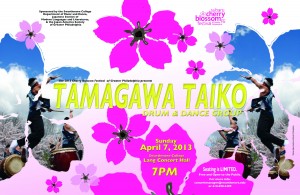Bryn Mawr College Performing Arts Series Closes 2012-2013 Season with Tour-De-Force Performance by Sheetal Gandhi on March 22
Final performance caps season of virtuosic and adventurous works in the arts
BRYN MAWR, PA – February 27, 2013 – The 2012-2013 season of the Bryn Mawr College Performing Arts Series concludes Friday, March 22 with Bahu-Beti-Biwi, a solo performance by intercultural, multi-disciplinary director, choreographer and performer Sheetal Gandhi. Reviewed as “striking” and “stunning” in The Philadelphia Inquirer, Gandhi incorporates elements of contemporary and traditional dance, dramatic multi-lingual vocalizations and percussive text to comment on the Indian diaspora and the traditional roles of women in India.
In Bahu-Beti-Biwi, which translates to Daughter-in-law, Daughter, Wife, movement and music create the transition between characters inspired by women from Gandhi’s life. The piece is influenced by North Indian musical traditions that are brought into a contemporary context. Humor and tension create a platform for scenes of freedom and compromise, desire and longing, duty and love. Gandhi has performed the work around the globe.
“Bryn Mawr, an all-women’s college, looks forward to presenting Sheetal Gandhi’s important take on the changing roles of women. Gandhi is a mesmerizing performer who both entertains and addresses challenging issues,” says Lisa Kraus, Coordinator of the Bryn Mawr College Performing Arts Series.
Thursday March 21
– 4-5:30 pm Master Class: Sheetal Ghandi (this is the time we traditionally use for this, as a class meets at this hour) – Pem Studio
Contemporary Kathak class which specifically focuses on learning the rhythms and the rhythmic cycles used in North Indian classical music, some technique from this form, and then a short traditional piece. I show them how I translate the piece into a more contemporary language, and they learn this as well. It is a speaking/dancing class. I do this most often with students coming from a dance background. The rhythms can be learned by anyone, but when we get into the real choreography of it, it is better if they have some dance background.
– 7pm Lecture-demonstration Aspects of Ms. Gandhi’s experience moving from traditional forms and developing into a multi-disciplinary artist who works in a variety of theatrical contexts (possibly including screening of video clips).
Friday, March 22
-12-1:30 – Lunch in the Dorothy Vernon Room at Bryn Mawr for students of South Asian Women’s club and anyone interested in an informal meeting and discussion
-8 pm Performance: Bahu Beti Biwi – on McPherson Stage
Saturday March 23
-10:30 -12:00 am Community Class in Bollywood Dance (children and adults) – on McPherson Stage
Burn off steam in the contagiously fun fusion style of dance that is called, “Bollywood Dance”. Each class offers an injury-preventative warm-up of body isolations, integrated with stretching and preparatory technical exercises for Indian dance movement. Participants will:
- learn traditional Indian styles based on both folk and classical forms
- learn important story-telling skills through dance
- learn choreography to popular Bollywood and Bhangra songs
-12:30 – 2:30 pm Workshop: These Embodied Voices – on McPherson Stage
This workshop is based on Liz Lerman techniques, exercises by Simone Forti, and Sheetal’s own artistic process as a multi-disciplinary story-teller. The workshops focus on different ways of pairing text, song and sound with gesture to create meaningful and evocative, full-bodied stories. Participants work together and work alone to source material through improvisation, choreographic and theatrical structures, free-writing, research, and dialogue. They may explore their cultural identities, histories, genders, and spiritual backgrounds as these subjects relate to the development of performance.
******
Bryn Mawr’s Campus is located at 101 N. Merion Ave. Tickets to individual events in the Bryn Mawr Performing Arts Series are $20 for general admission, $18 for seniors, $10 for students with ID and Dance Pass holders, and $5 for children under 12. Tickets and more information are available online at brynmawr.edu/arts/series.html or by calling 610-526-5210.
ABOUT SHEETAL GANDHI
Sheetal Gandhi is a veteran performer whose career has spanned genres and disciplines for the last fifteen years. She worked as a creator and performer in Cirque du Soleil’s Dralion, played a leading role in the Broadway production of Bombay Dreams and is featured on the original American cast album of Stephen Schwartz’s Children of Eden. Most recently, Gandhi was the choreographer for Los Angeles based Cornerstone Theater Company’s first-ever musical, Making Paradise: The West Hollywood Musical. Gandhi is a 2011 recipient of the prestigious C.O.L.A. grant, awarded by the Los Angeles Department of Cultural Affairs and a recent APPEX (Asian Pacific Performance Exchange) fellow, participating in a three week international artistic residency in Bali, Indonesia. Gandhi’s solo and group work has been presented in theaters around the country including REDCAT (Los Angeles), Asia Society (New York), Mu Performing Arts (Minneapolis) and ODC Theater (San Francisco) as well as national and international Festivals including Black Magic Woman Theater Festival (Amsterdam), The National Asian American Theater Festival (New York), Bridges Choreographic Dialogs (Israel), Delhi International Arts Festival (India), Festival of Contemporary Dance (Mexico), and more.
 Truly one of the highlights of the Subaru Cherry Blossom Festival – the Tamagawa Taiko Drum and Dance group return to Philadelphia for a week of awe-inspiring performances. Ready yourself for thundering drums, intricate dances, beautiful costumes and a whole lot of fun.
Truly one of the highlights of the Subaru Cherry Blossom Festival – the Tamagawa Taiko Drum and Dance group return to Philadelphia for a week of awe-inspiring performances. Ready yourself for thundering drums, intricate dances, beautiful costumes and a whole lot of fun.